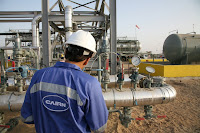The month of May was an extraordinary one for those following crude price fluctuations. Cumulatively speaking, both the major oil futures markets saw the oil price tumble by nearly a fifth since April 30. Over the last fortnight, the price of oil closed below US$70 a barrel for the first time in 2010 driven down by the Greek debt crisis as well as US inventory build-up.
 However, between May 26 and 28, the market witnessed a spectacular rebound when the NYMEX contract for July spiked nearly $7 a barrel. Hence, the weekly rise on the back of a healthy 48 hours came in at 5.6% or $3.93 a barrel. Impressive as it may appear, several market commentators I spoke to on the day seemed reluctant to rule out fresh lows over the course of next week (and well into June).
However, between May 26 and 28, the market witnessed a spectacular rebound when the NYMEX contract for July spiked nearly $7 a barrel. Hence, the weekly rise on the back of a healthy 48 hours came in at 5.6% or $3.93 a barrel. Impressive as it may appear, several market commentators I spoke to on the day seemed reluctant to rule out fresh lows over the course of next week (and well into June).
There’s plenty to spook the markets – Greece debt crisis, the Euro’s woes as a result of it, Spain’s recent debt ratings downgrade and US consumer spending. Brent’s premium to NYMEX, which was markedly visible mid-May, also disappeared by Friday.
Predictably, near-term futures contracts are trading at a discount to more-distant contracts. Prices for the most actively traded NYMEX futures contract fell 14.1% or $12.18 in May, the worst month on record since December 2008. Concurrently, over the same period, the front-month Brent crude contract fell 15.4% or $13.42 a barrel, the highest monthly decline since November 2008.
Overall, May was a tough old month for energy futures in general, with perhaps the notable exception of Natural Gas. Expect more of the same in June.
© Gaurav Sharma 2010. Chart Courtesy © Digital Look/BBC
 However, between May 26 and 28, the market witnessed a spectacular rebound when the NYMEX contract for July spiked nearly $7 a barrel. Hence, the weekly rise on the back of a healthy 48 hours came in at 5.6% or $3.93 a barrel. Impressive as it may appear, several market commentators I spoke to on the day seemed reluctant to rule out fresh lows over the course of next week (and well into June).
However, between May 26 and 28, the market witnessed a spectacular rebound when the NYMEX contract for July spiked nearly $7 a barrel. Hence, the weekly rise on the back of a healthy 48 hours came in at 5.6% or $3.93 a barrel. Impressive as it may appear, several market commentators I spoke to on the day seemed reluctant to rule out fresh lows over the course of next week (and well into June).There’s plenty to spook the markets – Greece debt crisis, the Euro’s woes as a result of it, Spain’s recent debt ratings downgrade and US consumer spending. Brent’s premium to NYMEX, which was markedly visible mid-May, also disappeared by Friday.
Predictably, near-term futures contracts are trading at a discount to more-distant contracts. Prices for the most actively traded NYMEX futures contract fell 14.1% or $12.18 in May, the worst month on record since December 2008. Concurrently, over the same period, the front-month Brent crude contract fell 15.4% or $13.42 a barrel, the highest monthly decline since November 2008.
Overall, May was a tough old month for energy futures in general, with perhaps the notable exception of Natural Gas. Expect more of the same in June.
© Gaurav Sharma 2010. Chart Courtesy © Digital Look/BBC



